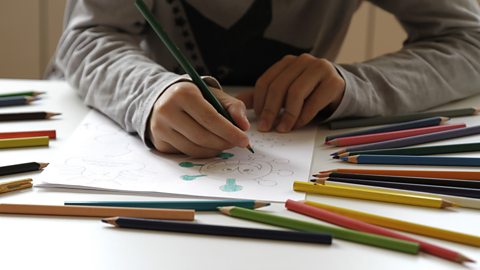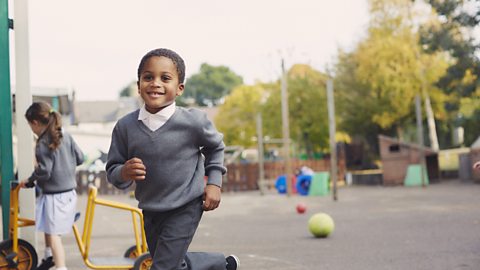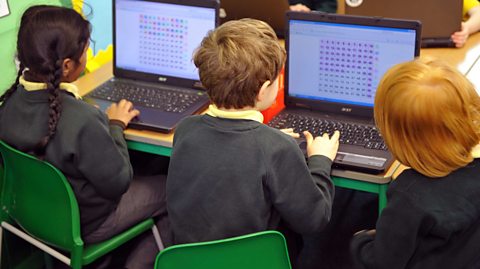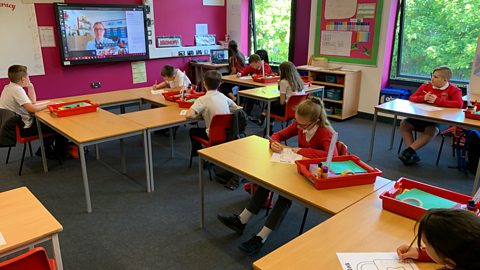
This article was first published in the Spring of 2021.
As the nations of the UK continue our route out of lockdown, the impact of Covid-19 on the children of the country remains widely felt.
Since the outbreak of the global pandemic, organisations including the former , the and , amongst others, have highlighted increased child protection and wellbeing risks that Covid-19 may pose to children, beyond the disruption to their education over the past two years.
Parents and carers are likely to be under more pressure, children have been more exposed to a variety of online sources, pupils and students have less access to trusted adults beyond the home and some protective services have seen a reduced service to comply with social distancing or lockdown measures. Even with relaxations in lockdown measures, the is likely to persist for some time.
So how can educators help to safeguard children during this difficult period, even as the country returns to a semblance of normality?
We spoke to a school's safeguarding lead to find out and gathered together some advice from organisations that could help.
The ±«Óătv is not responsible for the content of external websites.



Focus on wellbeing
My top concern is always going to be mental health of the children.
David Grimes, Assistant Vice Principal and Safeguarding Lead
Even as focus is placed on helping children âcatch upâ on months of missed learning, prioritising wellbeing can help ease childrenâs return to school, and have a positive impact on their schooling. The suggest that social and emotional learning interventions can have an âaverage overall impact of four monthsâ additional progress on attainmentâ.
A found that parents in Englandâs concerns around school closures were more about their child not seeing their friends and socialising (49%) and their childâs mental health and wellbeing (45%) than their child falling behind in their education (30%) and their child missing out on face to face learning from teachers (29%).
And a with 2,438 young people aged 13-25, between 26th January and 12th February 2021, found that 67% believed that the pandemic will have a long-term negative effect on their mental health.
But there are things that teachers can do to help.
David Grimes, an Assistant Vice Principal and Safeguarding Lead at a school in Manchester says: "A happy child is a learning child. With it being spring, going into summer, there are a lot more opportunities for children to get outside, which will be really helpful. Children can also be encouraged to take part in mindfulness or think about little things that they can do to make themselves feel better in the moment."
The also say that âit is important not to assume that all pupils have found recent events traumatic or negative â pupils will have had different experiences of the pandemicâs impact and may have developed new skills and coping strategiesâ.
The Department of Education have pledged an additional ÂŁ79m dedicated towards increasing mental health support for schools and colleges.
Bitesize Learning Zone, launching on C±«Óătv and ±«Óătv iPlayer on school days into the summer months, include a dedicated wellbeing day, designed to encourage good mental and physical health, and our PSHE resources on ±«Óătv Teach for KS1, KS2, KS3 and KS4 could help with supporting your students.
If your students need individual support, Bitesize Support has lots of content to help, and parents can find some expert tips and advice on Bitesize's Parent Toolkit.

Staying aware of children and their families
Working with parents and families continues to be a cornerstone of educatorsâ work, though this might prove more challenging, with difficulties in keeping in touch with families, especially those with limited access to and engagement with technology.
"There are a lot of pressures being put on families in terms of financial pressure that we canât see the impact of yet," says David. "I work in an inner city school and there are levels of disadvantage and poverty here that are becoming wider. There could be an impact on child mental health and whether parents will be able to meet the basic needs of their children. You might want to be aware of little things like a child wearing school uniform that is too small."
"When that poverty gap increases, when families experience poverty and destitution, an older child might also be more vulnerable to different sort of exploitation, like gangs or pressure to earn money for the family."
The Social Care Institute for Excellence (SCIE) has to help safeguard children and families during the crisis, encouraging practitioners to âthink about the children and families that you work with and how they are managing in the current contextâ. For example: Are families aware of how government plans could support them? Are they aware of when and how to seek support? They recommend âshowing curiosity whilst being mindful of not interfering too much simply because the current situation brings risks and anxietiesâ.
Be aware that behaviour is a form of communication.
David Grimes, Assistant Vice Principal and Safeguarding Lead
"When children misbehave, they are trying to communicate something, and itâs often something theyâre struggling to say out loud," David advises. "If there's been a change in their behaviour, itâs more likely than not to be a form of communication. Create safe spaces for them to talk or disclose things that might be troubling them." He acknowledges, however, that this might be challenging at this current time. "It feels difficult at the moment as weâve all been disconnected from our students. It's about rebuilding that connection with them."
The , including âreviewing support for all children currently known to the [âŠ] child protection officerâ, sharing information on children missing from education with the local authority, and training and support for staff, including âtraining on child development science and how trauma can manifest in behavioural problems or poor emotional regulationâ, whilst .
"Keep up to date with your training," David suggests. "And don't take it all on yourself. Teamwork is really important in any safeguarding context. Use the multi-agency support system that exists to support families and young people. Talk to your managers and school leaders and talk to your safeguarding leads in school - they will know what to do or will be able to find out how best to support a young person or family."
The have said that they are âplacing social workers in schools to help spot the signs of abuse and neglect more quickly and work with teachers to support children at riskâ.
And if youâre struggling with virtual communication with parents and carers in these challenging times, this article from Dr Emma Kell could prove helpful.

Supporting healthy online behaviour
With the gradual return to schools, more and more children and teenagers will be returning to face-to-face education, but a continued focus on positive online behaviour can be beneficial, especially as so much of children and young peopleâs social and leisure activity has migrated online in these past months.
The pandemic has pushed a generation of children into increased online activities, and not all children will be ready for navigating the online world, no matter how much you talk about e-safety in school, because itâs dependent on the boundaries that are in place in the home.
David Grimes, Assistant Vice Principal and Safeguarding Lead
"The challenge can be addressed through curriculum and parent partnerships," says David. "Schools and teachers having good e-safety training is key, and developing some expertise within the culture of safeguarding within the school. There should be an open dialogue with parents in parent forums and parent meetings. You could even have experts on e-safety come in and lead on parent events, signposting those events to families of students who you feel are at risk. We should also develop the skillset amongst teachers to empower them to have those difficult conversations with parents."
The UK Council of Internet Safety (UKCIS) have published a , whilst the UK Safer Internet Centre continue to provide on e-safety in and out of the classroom.
On ±«Óătv Teach, our Safer Internet Day Live Lesson, which can be viewed at any time from school or from home, provides a helpful introduction for primary pupils into staying safe, sensitive and smart online, and our panel discussion programme for educators contains some tips and advice from fellow teachers and mental health practitioners on how schools can approach online safety.
has lots of information to help children and young people with their online life, from help and advice to skills and inspiration.


Sensitively encourage and normalise discussion in schools
Have a culture of safeguarding within the school.
David Grimes, Assistant Vice Principal and Safeguarding Lead
Although safeguarding tends to be a word used amongst adults, experts suggest that normalising discussion about safeguarding concerns amongst children can help empower them to speak out.
âAs many young people have had, and may continue to face, challenging experiences during the pandemic, it is important to provide space to talk about what has happened but to do so in a distanced way,â suggests the PSHE Association in their updated . âUsing stories, pictures, puppets, scenarios and video clips as discussion stimuli provides a way to de-personalise discussions so pupils can explore sensitive issues objectively.â They suggest âincreased opportunities for pupils to make safeguarding disclosuresâ as part of a whole school approach to safeguarding and wellbeing.
And a whole school approach is what David advocates as well. "It's important to have a culture of safeguarding within the school. That can be through the curriculum, taking part in Mental Health Awareness Week, or signposting services like and ."
also suggests âthe development and roll-out of child-friendly complaints and feedback mechanisms in schools and other education facilitiesâ as part of their brief to support child protection practitioners during COVID-19. They recommend that schools should âdevelop, disseminate or display messages [âŠ] about child protection and available servicesâ.

Responding to the news
Recent widespread allegations of sexual abuse made by school pupils on the Everyone's Invited website has been alarming to many working in schools, colleges and universities.
A new helpline, run by the NSPCC, offers support to potential victims and provide advice to children and adults. The Report Abuse in Education helpline can be reached on 0800 136 663, on Monday to Friday 08:00 to 22:00, or 09:00 to 18:00 at weekends. It can also be contacted by email at help@nspcc.org.uk
In addition to this and the resources signposted above, offers free and confidential support and advice for children and the NSPCCâs is aimed at children aged 5 â 11, and is designed to help children understand abuse and where to get help.
And if the children you work with are upset or worried by the news, Own It has .
This article was published on 15th April 2021.
Worried and looking for guidance? The NSPCC has pulled together on how schools and education settings can keep children safe during the pandemic, last updated on 12th April 2021.

If youâre a teacher in need of support, call free and confidential 24/7 emotional support helpline on 08000 562 561.
The ±«Óătv is not responsible for the content of external websites. By clicking the link to access the external website you will be redirected to a site controlled by Education Support. Please note that the ±«Óătv is not the data controller of the personal data you enter into the external website and it is not responsible for the services provided by any external organisation. When using an external website, you are subject to their Terms and Conditions and Privacy Policy.

How to make virtual parents' evenings a success. document
Tips on managing parents evening in a time of video calls and social distancing.

Tips to help children regain lost learning. document
How teachers are dealing with the continuing disruption caused by Covid-19.

How to cope with Covid stress. document
As research shows teacher's stress levels have increased due to Covid-19, here are some tips for managing mental health.
